- Home
- Paulo Coelho
Hippie Page 10
Hippie Read online
Page 10
“Could we not place our backpacks on top of the bus to leave more space for our legs?”
“Of course you can. But don’t be surprised if they’re not there when we stop for coffee. Inside, in the back of the bus, we have space for luggage. One piece, as it says on the back of the slip with a map of our route. And drinking water isn’t included in the price of the ticket, so I hope you’ve brought your water bottles. You can always fill them up when we stop for gas.”
“And if something goes wrong?”
“What do you mean?”
“If one of us gets sick, for example.”
“I have a first aid kit. But as the name itself suggests, it’s just first aid. Enough to make it to some city and leave any sick passengers there. So be sure to take care, very good care of your physical health, just like you like to think you do with your souls. I’m sure you all have been vaccinated against yellow fever and smallpox.”
Paulo had the first vaccination—no Brazilian could leave his country without it, perhaps because foreigners always imagined them to be carrying all sorts of diseases. But he hadn’t had the smallpox vaccine, since in Brazil it was believed that a childhood illness—measles—provided the body with natural immunity.
Whatever the case, the driver didn’t ask anyone for a vaccination record. People began boarding and choosing their seats. More than one person set their backpacks on the seats next to them, but soon they were confiscated by the driver and thrown in back.
“Other people are going to board along the way, jerks.”
The girls who looked to be underage, perhaps they were using fake passports, sat next to one another. Paulo sat next to Karla, and the first thing they did was work out a system of rotating shifts to see who would take the window. Karla suggested they trade places every three hours, and that at night, so they could get a decent night’s sleep, she would sit next to the window. Paulo took this suggestion to be immoral and unjust since that would leave her with somewhere to rest her head. They agreed that they would alternate nights taking the window seat.
The engine turned over, and the school bus, with nothing romantic about it beyond its name, Magic Bus, began the journey of thousands of miles that would take them to the other side of the world.
“As the driver was talking, I got the feeling we were starting off not on some adventure but on some sort of mandatory military service, like we have in Brazil,” Paulo said to his companion, remembering the promise he’d made to himself as he descended the Andes by bus and the many times he had broken it.
The comment irked Karla, but she couldn’t start a fight or move places just five minutes into their journey. She took the book from her handbag and began to read.
“So, are you happy we’re going to the place you wanted? By the way, the guy back at the ‘agency’ pulled one over on us—there are still empty seats.”
“He didn’t pull one over on us—you heard the driver say other people will climb on along the way. And I’m not going to the place I wanted—I’m returning to it.”
Paulo couldn’t make sense of her response, and she didn’t provide any further explanation, so he decided to leave her in peace and began to concentrate on the broad flatlands around him, intersected by canals on all sides.
Why had God created the world and the Dutch, the Netherlands? Was there not much land on the planet waiting to be occupied?
Two hours later everyone had become friends—or had at least introduced themselves, since one group of Australians, though friendly and full of smiles, wasn’t very interested in talking. Nor was Karla; she pretended to read that book whose name she’d already forgotten, but she must have been thinking about nothing but their destination, their arrival in the Himalayas, even though they were still thousands of miles away. Paulo knew from experience how such things could generate anxiety, but he didn’t say a word; as long as she didn’t take her bad mood out on him, everything was fine. If she did, he would change places.
Behind them were two French people, a father and his daughter, who seemed neurotic but enthusiastic. Next to them, an Irish couple; the young man introduced himself right away and took the opportunity to tell them he’d made the trip once before. Now, he was going back with his girlfriend because Kathmandu—“if we manage to make it there, of course”—was a place where you ought to spend at least two years. He’d come back earlier the first time because of his job, but now he’d left it all behind, sold his collection of miniature cars, had made a good bit of money with this (how could a miniature car collection render so much money?), and left his apartment. He summoned his girlfriend to go with him, and had a smile that stretched from one side of his face to the other.
Karla listened to the part about it being “a place where you ought to spend at least two years” and, abandoning the pretense she was reading, asked why.
Rayan, as the Irishman was called, explained that in Nepal he’d felt as if he’d stepped outside time, stepped into a parallel reality where everything was possible. Mirthe, Rayan’s girlfriend, was neither friendly nor unfriendly, but she no doubt wasn’t convinced that Nepal was a place everyone should spend the coming years.
However, by the looks of it, her love had won out.
“What do you mean, ‘parallel reality’?”
“That spiritual state that takes over your body and soul when you feel happy, your heart filled with love. Suddenly, everything that’s part of your daily life takes on a new meaning; colors become more vibrant, what bothered you before—like cold, rain, solitude, study, work—everything seems new. Because, for at least a fraction of a second, you’ve entered the soul of the universe and tasted the nectar of the gods.”
The young Irishman seemed content to have to put into words something that could only be experienced. Mirthe looked as if she wasn’t much liking this conversation with the pretty Dutch girl—she was entering the opposite parallel reality, the one that makes everything all of a sudden seem ugly and overwhelming.
“There’s the other side, too, when the tiny details of our daily life transform into problems out of nothing,” Rayan continued, as though guessing at his girlfriend’s state of mind. “There is not one but many parallel realities. We’re on this bus because that’s what we’ve chosen; we have thousands of miles ahead of us and we can choose how we travel: in search of a dream that once seemed impossible or thinking about how the seats are uncomfortable and everyone’s unbearable. Everything we envision now will set the tone for the rest of the trip.”
Mirthe pretended not to understand that the comment was directed at her.
“When I was in Nepal for the first time, it seemed I had a sort of pact with Ireland, and this pact had not been broken. A voice in the back of my head kept repeating: ‘Live this moment, make the most of each second because you’re going to return to your country, don’t forget to take photographs to show your friends how you were fearless and courageous and had experiences they would like to have but lack the courage to chase.’
“Until one day, I went to visit a cave in the Himalayas with a few other people. To our surprise, in a place where practically nothing grows, there was a tiny flower, half the size of a finger. We thought it was a miracle, a sign, and to show our respect we decided to hold hands and chant a mantra. A few seconds later the cave seemed to tremble, the cold no longer bothered us, the mountains in the distance suddenly seemed closer. And why did this happen? Because those who had lived there before left behind a love vibration that you could almost touch, that was capable of holding sway over anyone and anything that came to that place. Just like that flower seed the wind had carried there, as though desire—the enormous desire we all had that the world outside could be a better place—were taking on physical form and affecting everything in its path.”
Mirthe must have heard that story several times, but Paulo and Karla were fascinated by Rayan’s words.
“I don’t know how long it lasted, but when we returned to the monastery where we were staying and recounted what had happened, one of the monks told us that someone who they referred to as a saint had lived there for decades. The monks also said that the world was changing and that all passions, absolutely all of them, would become more intense. Hate would grow stronger and more destructive, and love’s face would shine through.”
The driver interrupted the conversation, saying that, in theory, we ought to continue on to Luxembourg and spend the night but since he imagined that no one there had the goal of stopping in the principality, they would continue driving and sleep in the open air near a German city named Dortmund.
“I’m going to stop soon so we can grab something to eat and I’ll call the office, letting them know the next passengers ought to be ready for an early departure. If no one is going to Luxembourg, we’ll save precious miles.”
Applause. Mirthe and Rayan were about to return to their seats when Karla interrupted them.
“But I thought you could only leap into a parallel reality by meditating and surrendering your heart to the Divine One?”
“I do this every day. But I also think about that cave every day. About the Himalayas. About those monks. I think I’ve done my time in what they call Western civilization. I’m looking for a new life. Not to mention, now that the world is in fact changing, both positive and negative emotions are going to gain force, and I—we, actually—am not about to face the dark side of life.”
“There’s no need,” Mirthe said, taking part in the conversation for the first time and showing that she’d been able to overcome jealousy’s venom in just a few minutes.
In some sense, Paulo knew everything that Rayan had just told them. He’d already had similar experiences—in most situations where he’d had a choice between revenge and love, he’d chosen love. It hadn’t always been the right choice, at times he’d been called a coward, at times he himself was moved more by fear than by the sincere desire to make the world a better place. He was a human being, with all the fragility that entails; he didn’t understand everything that happened in his life, but he truly wished to believe he was traveling in search of the light.
For the first time since he’d climbed onto the bus, he understood that it had been written, he needed to make that journey, to meet those people, to do something that he often preached but hadn’t always had the courage to do: deliver himself up to the universe.
* * *
—
As time went on, people split off into groups, in some cases on account of language, in others because there was some nonverbal interest at play—sex, for example. For everyone but the two girls—most certainly minors, they kept a distance from everything and everybody precisely because they felt they were the center of attention, which they were not—the first five days had gone by quickly, because everyone was discovering themselves in the others and trading stories. Boredom was not a passenger, and the routine was broken only by stops at gas stations to fill up the gas tank and their water bottles, grab a sandwich and a drink, go to the bathroom. The rest was conversation, conversation, and more conversation.
Everyone slept beneath the stars, more times than not jittering with cold but grateful to be able to look to the sky and know that they could speak with the silence, sleep in the company of angels they could almost see, cease to exist for a few moments—even if it were only fractions of a second—as they felt eternity and infinity all around them.
Paulo and Karla paired off with Rayan and Mirthe—more accurately, Mirthe joined the group against her will; she’d already heard that story about parallel realities many times in her life. Her participation, meanwhile, was limited to keeping constant vigil over her man so that she didn’t find herself forced to turn back midway because she hadn’t managed to do something rather simple: continue being an interesting woman even after two years with Rayan.
Paulo had also noted interest on the part of the Irishman, who at the first opportunity asked whether he and Karla were together, receiving a direct response from Karla:
“No.”
“Good friends, then?”
“Not even. Just travel companions.”
And wasn’t that the truth? Paulo decided to accept things as they were and forget pointless romanticism. They were two mariners sailing to some far-off land; though they shared a cabin, one slept on the bottom bunk and the other on top.
The more interest Rayan showed in Karla, the more Mirthe became insecure, her fury building—without her letting on, of course, because this would entail an unacceptable sign of submissiveness—and sidled up to Paulo, sitting next to him as they spoke and, now and then, resting her head on his shoulder as Rayan told them about everything he had learned after returning from Kathmandu.
“Amazing!”
After six days on the road, enthusiasm gave way to boredom and routine set in, permeating the atmosphere. Now that no one had anything new to say, everyone began to think about how they’d hardly done anything but eat, sleep outside, try to find a more comfortable position in their seats, open and close windows on account of cigarette smoke, grow tired of telling their own stories and talking with others—who never lost an opportunity to exchange little barbs here and there, like the rest of humanity did when in a herd, even if it was small and full of good intentions like this one.
* * *
—
That is, until the mountains emerged before them. And the valley. And the river that cut through the giant rocks. Someone asked where they were, and the Indian man from earlier said they had just crossed into Austria.
“Soon we’ll get off and stop near the river running in the middle there so we can all clean up. Nothing better than cold water to make you feel that you have blood running in your veins and thoughts you can cast aside.”
Everyone became excited by the idea of taking off all their clothes, the absolute freedom, this connection to nature without any intermediaries.
The driver turned onto a rocky road, the bus swung from one side to the other, and many people screamed for fear of turning over, but the driver only chuckled. They had finally arrived at the bank of a stream or, more accurately, a branch of the river that broke off from the rest, forming a gentle curve where the water was calmer before it rejoined the flowing current.
“Half an hour. Take the opportunity to wash what you’re wearing.”
Everyone ran for their backpacks—any hippie pack always included a tiny hand towel, a toothbrush, and bars of soap, since they always ended up camping rather than staying in hotels.
“It’s so funny, this business of people thinking we don’t take showers. It’s possible we’re even cleaner than the majority of all the family men and women who level these accusations.”
Accusations? Who cared about that? Simply recognizing these criticisms gave power to their critics. The person who made this comment was the target of a series of angry looks—they had never paid any attention to what others said. Well, that was only half-true; they liked to call attention with their clothes and their flowers, their open and provocative sensuality, their low-cut blouses that hinted at breasts without bras, that sort of thing. And long skirts, because these were more sensual and more elegant—at least that was the determination of the group’s self-proclaimed stylists, whoever they were. Sensuality, by the way, wasn’t a means of attracting men but a way of being proud of your own body and making sure everyone noticed.
Those without towels grabbed spare T-shirts, blouses, sweaters, underwear—anything that could be used to dry off. Then they went down to the river, tossing off their clothing as they ran except the two young girls, of course, who took off their clothes but kept on their bras and panties.
A fairly strong cold wind blew in, and the driver explained that because the place they’d come to was dry and at a high altitude, the humidity and the ai
r currents would help everything to dry much faster.
“That’s why I picked this spot.”
No one along the road above could see what was happening. The mountains kept the sun from coming out, but such was the place’s beauty—rocks surrounded them on both sides, pine trees clinging to the sides, stones polished by centuries of friction—that the first thing they decided to do was to throw themselves into the cold water without thinking—all at once, shouting, throwing water on one another, a moment of communion among the varied groups that had formed, as though to say, “This is why we live as pilgrims, because we belong to a world that hates standing still.”
If we stay quiet for an hour, we’ll begin to hear God, Paulo thought to himself. But if we cry out with joy, God will also hear us and come down to bless us.
The driver and his assistant, who must have seen the nude bodies of young people unafraid to bare themselves a million times, left the group to take a bath and went to check the tire pressure and oil.
That was the first time Paulo had seen Karla naked, and he had to keep his jealousy in check. Her breasts were neither large nor small, they reminded him of the model they’d seen during the photo shoot back in Dam Square—but actually, she was much, much more beautiful.
But the real queen of them all was Mirthe, with her long legs and perfect proportions, a goddess who’d descended upon some valley in the middle of the Austrian Alps. She smiled when she noticed Paulo watching her, and he smiled back, knowing that it all added up to nothing more than a game to make Rayan jealous and prompt him to distance himself from his Dutch temptation. As we all know, a game with ulterior motives can still become a reality—and for a moment Paulo dreamed of it and decided that from there on out he was going to make a greater effort with the woman who—of her own free will—was becoming increasingly close to him.

 The Alchemist
The Alchemist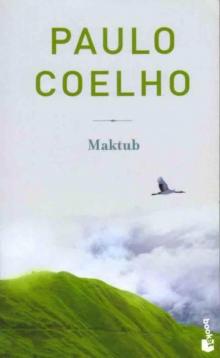 Maktub
Maktub Like the Flowing River
Like the Flowing River The Winner Stands Alone
The Winner Stands Alone The Spy
The Spy By the River Piedra I Sat Down and Wept: A Novel of Forgiveness
By the River Piedra I Sat Down and Wept: A Novel of Forgiveness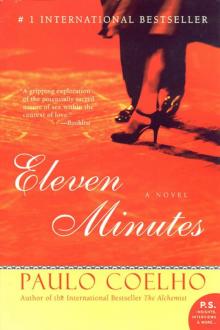 Eleven Minutes
Eleven Minutes Manuscript Found in Accra
Manuscript Found in Accra Warrior of the Light
Warrior of the Light Veronika Decides to Die: A Novel of Redemption
Veronika Decides to Die: A Novel of Redemption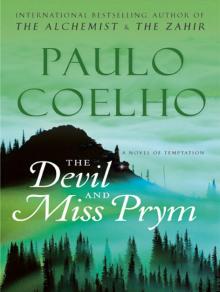 The Devil and Miss Prym: A Novel of Temptation
The Devil and Miss Prym: A Novel of Temptation The Valkyries: An Encounter With Angels
The Valkyries: An Encounter With Angels Brida: A Novel
Brida: A Novel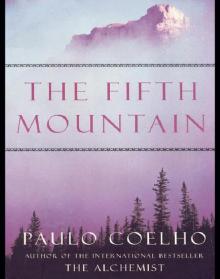 Fifth Mountain: A Novel
Fifth Mountain: A Novel Adultery
Adultery Inspirations
Inspirations The Archer
The Archer The Witch of Portobello
The Witch of Portobello The Pilgrimage
The Pilgrimage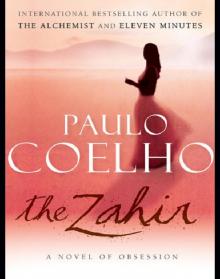 The Zahir
The Zahir Brida
Brida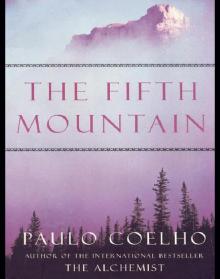 The Fifth Mountain
The Fifth Mountain Like the Flowing River: Thoughts and Reflections
Like the Flowing River: Thoughts and Reflections Manual of the Warrior of Light
Manual of the Warrior of Light By The River Piedra I Sat Down & Wept
By The River Piedra I Sat Down & Wept The Supreme Gift
The Supreme Gift Aleph
Aleph Hippie
Hippie Witch of Portobello
Witch of Portobello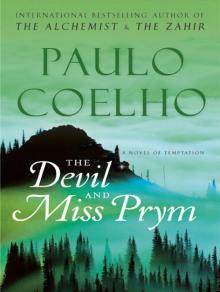 The Devil and Miss Prym
The Devil and Miss Prym The Alchemist - 10th Anniversary Edition
The Alchemist - 10th Anniversary Edition The Valkyries
The Valkyries